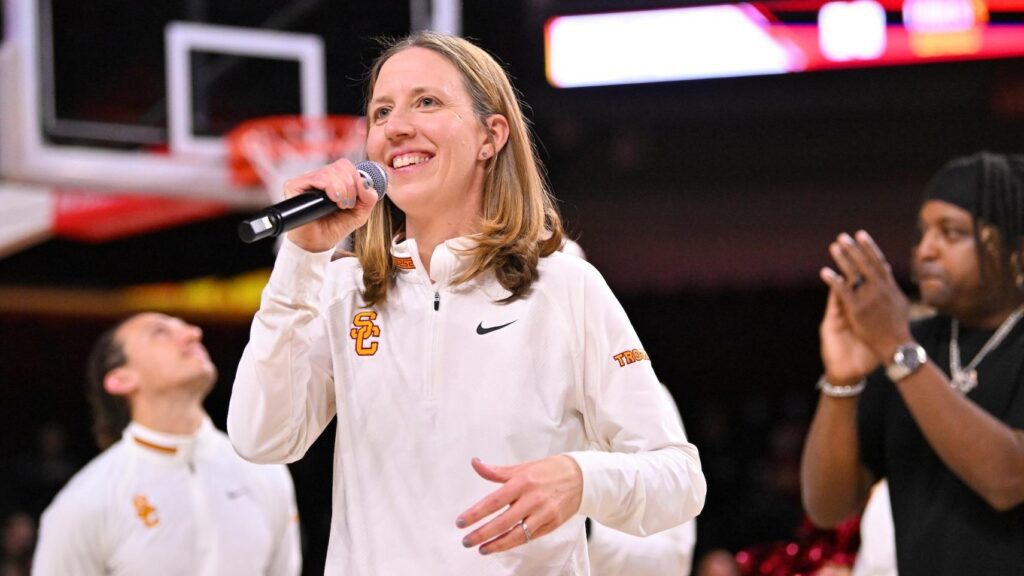How Lindsay Gottlieb’s coaching philosophy has unlocked JuJu Watkins and USC
The coach of the top-seeded Trojans has been unapologetic about loosening the reins for the transcendent freshman
Luca Evans (OC Register) — LOS ANGELES — Thirty minutes after a late January win over Washington State, JuJu Watkins trudges into the media room at the Galen Center, a self-inflicted weight drooping her shoulders. She clutches a customary postgame smoothie. She wears a scowl.
As the freshman eases into a seat at USC’s press-conference podium, her eyes drill straight to the box score in front of her. 29 points. 10-of-27 FG. She scoffs at herself, shaking her head. The scoffs aren’t new. Terrible, she’s muttered after games, at her own shooting lines.
Her efficiency is down since Pac-12 play started. Her shot volume has only gone up. Off-balance layups. Forced pull-ups early in the shot clock. The questions come at the postgame dais, and a sickly sweet note of nitpicking seeps in for the first time all year. Watkins, her own fiercest critic, crosses her arms. Sips the smoothie. Ever so slightly, a cord of tension grows.
And Lindsay Gottlieb leans into the mic and snaps it.
“I’ma answer this one,” Gottlieb says, a slight smile at another question critiquing Watkins’ efficiency.
“We are playing Pac-12 teams,” she professes in the tone of a third-grade-teacher, fire steadily building behind her words.
“With the amount of responsibility she has for our team, I want her to feel like, ‘I can miss, and figure it out,’” Gottlieb says, as Watkins’ teammate McKenzie Forbes nods in approval.
Watkins has missed, and figured it out, across a remarkable freshman season leading a No. 1-seeded USC (26-5) to a first-round NCAA Tournament matchup with Texas A&M Corpus Christi on Saturday.
And Gottlieb has let her. In the two-week break since the Trojans’ Pac-12 Tournament win, Gottlieb had an assistant clip and compile every single coverage Watkins has faced this season, sitting down with her to go over film.
“Very long,” Gottlieb smiled Wednesday.
Watkins is an undisputable generational talent. She is also a collegiate freshman who leads the nation in usage rate. She has problem-solved in real time, given room to roam free and hoist shots in 1-for-5 starts until she’s found the pulse on any given night. Somehow, around her, veterans all used to heavier contributions have completely bought into complementary roles while often – gleefully – accepting the shadow of an 18-year-old kid.
Gottlieb’s coaching philosophy, the love she’s instilled and the trust she’s inspired, is the key behind all of it.
“There’s not one ounce of me,” Gottlieb continued after that Washington State win, “that wants to change or stifle anything that she’s capable of doing. And if she’s 3 for 24 from three, I think she’s probably going to go 10-for-her-next-12.”
Two games later, Watkins went to Stanford and dropped 51 points.
The human element
Growing up in Scarsdale, New York, Gottlieb became childhood friends with future Duke point guard Hilary Heick, the two sharing basketball dreams and mock-commitment-announcement press conferences. On their suburban AAU team their teenage years, they had a trusty play-call: Low-four was a fancy name for a clear-out for Heick.
One game, Gottlieb remembered decades later, they took on the NY Liberty Belles, featuring future Hall of Famer Chamique Holdsclaw. Outmatched. But Heick had it going.
So in one stretch late, Gottlieb – the shooting guard – waved off their coach. She called clear-outs for Heick on three or four straight plays, Heick remembered, the future Duke guard scoring 39.
Four-low! We need a bucket!
It was the early bloom of a player-first coaching philosophy, predicated on trust, on knowing when reins needed to be loosened.
“I think from a human standpoint, and what we do in college coaching is so much the human element – I always sort of, try to meet people where they are,” Gottlieb said, light-hazel eyes bulging as they do when she’s passionate about something, which is about 95% of the time.
“Like, that’s been more of my philosophy versus saying, ‘Hey, you’ve lived your life this way for 17 years, and now you’re coming to my school and my program – you have to change everything to fit into this one box.’”
And Gottlieb did not as much recruit Watkins to USC as she recruited USC to Watkins.
In 2021, when Gottlieb’s career was on the rise as an assistant with the Cleveland Cavaliers, Watkins’ sheer existence was one of her reasons for taking the USC job. The best player in the country is there. She inherited a program that had lost touch with success and its reputation and its all-time great alumni, constantly preaching a message of “bringing pride back to USC,” as 2021 assistant Danyelle Grant remembered.
That would come with Watkins, a player who took tremendous pride in Los Angeles roots. In her recruitment, Grant, now an asst at Rice, remembered, Gottlieb would constantly hammer themes of family. Of community.
You can be the reason why.
“Why they’ve had the success that they’ve had, why are people watching USC, why are people so excited about it – she was the why,” Grant said.
Gottlieb is the how. She planned for this, building a free-flowing offense around Watkins’ transition dynamism. And trust runs deep.
“Best coach ever, honestly,” Watkins smiled, asked about her relationship with Gottlieb after dropping 42 points in a late February win over Colorado. “I’m just grateful that I’m able to be coached by her, and that I made that decision.”
The blueprints
Coaching a generational talent doesn’t seem like rocket science. Gottlieb, however, is very good at rocket science, the truest definition of a basketball junkie.
In her first year at USC, Gottlieb was talking through a practice plan with the coaching staff, her explanation moving so quickly that Grant had to ask her to put it up on a whiteboard.
If I could be inside her brain, Grant thought, I’d feel like a hamster on a pinwheel.
And the key to unlocking Watkins, from an on-court perspective, was Gottlieb’s two-year stop in Cleveland before taking the USC job. It couldn’t have been more perfect timing. After a long run as Cal’s head coach, she talked “more basketball than ever” as an assistant with the Cavaliers, Gottlieb reflected, doing a quarter of the team’s scouting.
And as she watched offenses flow, she realized schemes in the NBA were simpler. Structured, often, not around adhering to complicated sets but about getting great players the ball in spots to operate.
“It’s helped me not to overthink it,” Gottlieb said.
Pieces of her learnings showed up from her first season at USC. Gottlieb’s offense, Grant said, wasn’t structured so much around rigid plays but “blueprints.” Calculated possibilities could arise, alternate actions could branch. She’d create areas of the floor which specialists would occupy – shooters, post players, understanding how to fill those areas off broken plays and impromptu actions.
“Make plays,” as Grant put it, instead of “run plays.”
Post players Rayah Marshall and Kaitlyn Davis cycle through high-low actions in the post. Guard Kayla Padilla spots up as a knockdown threat in the corners. McKenzie Forbes offers a secondary scoring valve, running ball-screen action when plays break down. And the blueprint, now, is in Watkins’ hands, a smooth three-level scorer with a game designed perfectly to capitalize.
“I think we’re better off with JuJu feeling freedom and learning on the fly,” Gottlieb said in late February, “and being able to kind of have the freedom on the court to be the artist that she is.”
The trust
An hour after a USC game against Utah at Galen in late February, Gottlieb walked back up to a stage at center court surrounded by red-and-gold balloons, the program’s seniors sitting in a row of seats on the floor nearby.
USC had lost. Didn’t matter now. This was a moment deeper than basketball, to honor a group of young women that Gottlieb loved, in front of a crowd that had stayed – filling the lower basin – simply to witness the celebration.
The classic Senior Day convention in collegiate basketball – start your seniors, yank them after a couple minutes – just never sat right with Gottlieb. Instead, Gottlieb wanted to honor them properly, to put a ceremony right smack-dab in the middle of Galen for a community to witness.
So Gottlieb wrote personalized speeches for every single one of her seniors. And as she assumed the microphone at Galen that Sunday, emotion choked her words. Once. Twice. Too many times to count. Senior India Otto’s tribute came last, a guard who’d played a total of 26 games in five years for USC.
“We do have a team joke, kind of an inside thing, that Otto’s sort of a younger version of me – it comes up a lot,” Gottlieb told the crowd.
She turned to address Otto, tears welling, voice shaky before collapsing in a sob.
“But I want you all to know, and Otto to know, what an honor that is for me.”
The speeches sent a message, from seniors to freshmen, that they were cared for as people, Forbes reflected. Gottlieb has built this symbiotic trust for years with her programs, dating to Cal, hosting sessions the Golden Bears would call “Tuesdays with Jeezy” in which they’d eschew film to talk about anything but basketball.
“Our team has incredible trust in Lindsay,” assistant coach Beth Burns said. “Not just Ju. They all do. And it’s reciprocated. You can have an off night – everyone can have an off night. We ain’t changin’ a thing.”
After USC’s win over Stanford in the Pac-12 Tournament championship in Las Vegas, Gottlieb slowly climbed a ladder under a hoop at MGM Grand Garden Arena, cutting the final strings down from the net raising it aloft in triumph. Red-and-gold confetti rained. Tears rained with it.
Watkins exchanged hugs as the celebration continued, visibly gassed. She’d gone 2 of 15 on the night, Stanford’s Tara VanDerveer throwing yet another hyper-focused coverage at her. Watkins felt the pulse, and she’d figured it out, Gottlieb praising Watkins for making consistently strong reads as Forbes scored 26.
Standing off to the side as the hardwood slowly cleared, Watkins’ mother Sari smiled, marveling at it all.
“A lot of people would say, (she’s) the evolution of this game,” Sari said, speaking of Watkins. “And so, it’s important not to confine that, and to let that kinda evolve, and make the mistakes she’s gonna make. You know what I mean? There’s gonna be mistakes.
“But let it – let it happen.”
Lindsay Gottlieb is letting it happen.
No. 1 seed USC (26-5) vs. No. 16 seed Texas A&M-Corpus Christi (23-8)
NCAA Tournament first-round, 1:30 p.m. Saturday, Galen Center, ESPN
ocregister.com
___________

